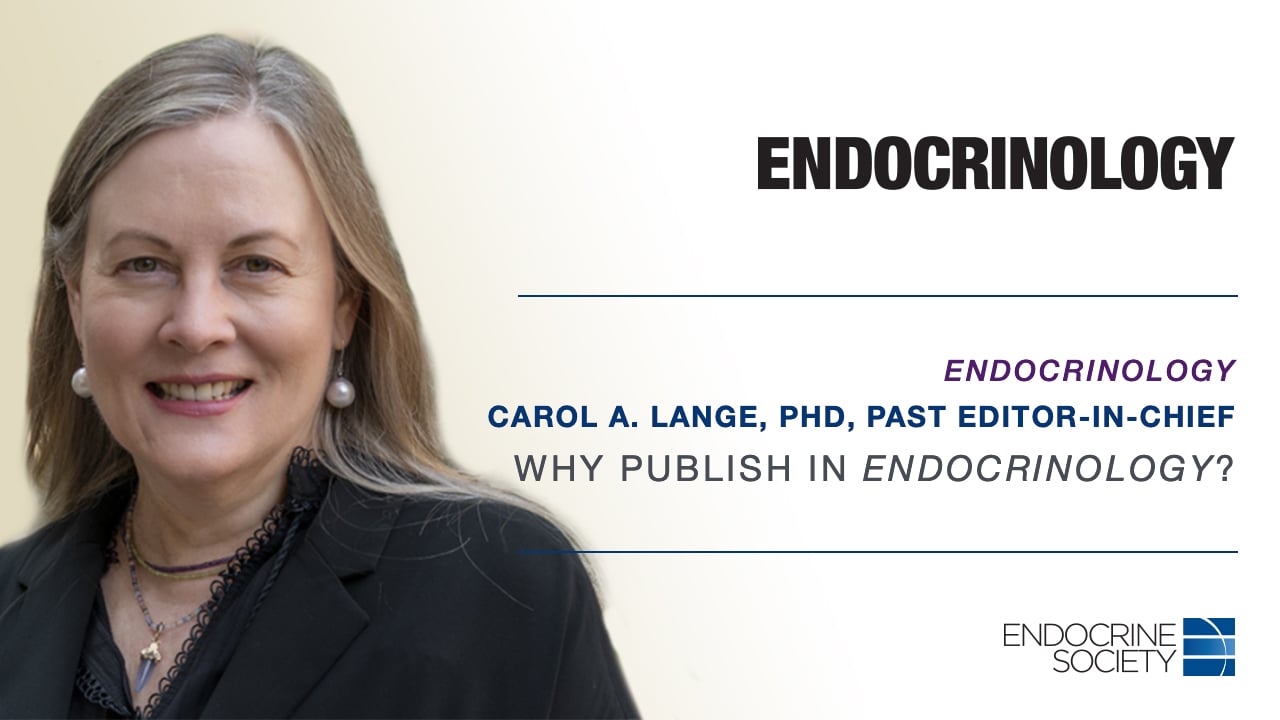Resources for pursuing endocrine-related research opportunities
Endocrine researchers are at the core of solving many of the most pressing health problems of our time, from diabetes and obesity to infertility, bone health, thyroid conditions, and hormone-related cancers. Your work has led to incredible accomplishments and remarkable progress in the biological and biomedical sciences that have benefited the lives of millions of Americans.
New NIH Website: The National Institutes of Health (NIH) has created a new website to serve as a hub for information on NIH’s implementation of new initiatives and policies. Highlights include a resource to keep up to date on grants and funding information status, upcoming policy changes, and recently implemented policy changes.
2025 dkNET Summer of Data Student Program: The NIDDK Information Network (dkNET) is a seven-week virtual summer program where participants will learn how to use dkNET and other data management tools, FAIR data, rigor and reproducibility, and develop data science skills. Preference will be given to those with research projects that involve antibodies, genetically modified organisms, and ‘omics’ data in NIDDK’s focus areas (obesity, diabetes, bone, metabolism, etc.) Participants also receive a $500 stipend. Apply before Monday, April 14 at 8:59 PM PT.
PhRMA Foundation Funding Opportunities: Letters of Intent are due Tuesday, April 15, at 12:00 PM ET for predoctoral fellowships, postdoctoral fellowships, and faculty starter grants in drug discovery, drug delivery, and translational medicine from the PhRMA Foundation. Apply today.
Simons Foundation Funding Opportunity: Scientists with a strong record of success and achievement in their field who have an interest in contributing to a new discipline are encouraged to apply for the Pivot Fellowship. This fellowship provides one year of academic support and funding for research, travel, and professional development. The mentor of the fellow will also receive funding to support the fellow’s research. Submit your application before the deadline on Thursday, May 15 at 12:00 PM ET.
HEAL Initiative: Interdisciplinary Team Science Funding Opportunity: The National Institute of Neurological Disorders and Stroke (NINDS) at the National Institutes of Health (NIH) is soliciting applications for HEAL Initiative: Interdisciplinary Team Science to Uncover the Mechanisms of Pain Relief by Medical Devices. Teams of experts (multiple investigators) are encouraged to work on collaborative projects in which each investigator brings a distinct scientific viewpoint or expertise for this type of grant. Apply for the next cycle by Monday, June 9.
NIGMS Interest in Research to Address Biological Sex Differences: The National Institute of General Medical Sciences (NIGMS) is encouraging research that focuses on sex differences in biological processes and in disease etiology and outcomes. Review example research topics that fall within the mission.
Environmental Health Sciences Core Centers Program (P30 Center Core Grants): Funding opportunities are available for the development and support of Environmental Health Sciences Core Centers. Core centers are facilities that support environmental health science research aimed at improving the understanding of the relationship between environmental exposures, human biology, and disease. Apply by Tuesday, March 18, 2025.
NIGMS T32 Program Areas of Interest: The National Institutes of Health (NIH) has issued a notice for the National Institute of General Medical Sciences (NIGMS) Predoctoral Basic Biomedical Sciences Research Training Program (T32). NIGMS is encouraging more T32 applications in the following areas of special interest: behavioral-biomedical sciences interface, biotechnology, and trans-departmental basic biomedical sciences. Applications from historically Black colleges and universities, tribal colleges and universities, and institutional development award states are encouraged. The final deadline is Friday, September 25, 2026.
NIDDK T32 MSRT Supplement: Institutions with T32 programs supported by the National Institute of Diabetes and Digestive and Kidney Diseases (NIDDK) at the National Institutes of Health (NIH) can apply for administrative supplements to provide mentored support for medical students interested in taking a year off from medical school to work in an academic research lab. Applications are due on Wednesday, March 19, 2025, Thursday, March 19, 2026, and Friday March 19, 2027.
Climate Change and Healthcare Research: The Agency for Healthcare Research and Quality (AHRQ) are interested in receiving health services research grant applications that address the intersection of climate change and healthcare. Specifically, applications that address three primary areas: 1) Reducing the healthcare sector’s greenhouse gas emissions and carbon footprint, 2) Creating resilient healthcare systems and communities that can plan, prepare, respond, and adapt to climate-related threats, and 3) Addressing the inequitable impacts of climate change. Learn more.
Continuity of Research Among First-Time NIH Grant Recipients Administrative Supplement: This retention program seeks to maintain the productivity of current first-time recipients of eligible independent NIH research project grant awards who are dealing with a critical life event(s), such that they can remain competitive for the first renewal of their award or for a second research project grant award. The overarching goal of this program is to enhance the retention of investigators facing critical life events who are transitioning to the first renewal of their first independent research project grant award or to a second new NIH research project grant award. The final application deadline is due on Wednesday, October 1, 2025.
Trailblazer Award Opportunity for New and Early Stage Investigators: The Trailblazer Award is an opportunity for new and early stage investigators to pursue research programs that integrate engineering and the physical sciences with the life and/or biomedical sciences. A Trailblazer project may be exploratory, developmental, proof of concept, or high risk-high impact, and may be technology design-directed, discovery-driven, or hypothesis-driven. Applicants must propose research approaches for which there are minimal or no preliminary data. View the application due dates and award cycles. The final application deadline is Thursday, October 16, 2025.
Maximizing Investigators’ Research Award for Early Stage Investigators: The National Institute of General Medical Sciences (NIGMS) announced they are planning to issue a funding opportunity announcement (FOA) to continue the Maximizing Investigators’ Research Award for Early Stage Investigators (MIRA-ESI) R35 program. ESIs are encouraged to submit an application that falls within the mission of NIGMS before the final application cycle deadline of Tuesday, February 3, 2026.
Urgent Competitive Revisions to Existing NIH Grants: The NIH announced that Principal Investigators on specific types of NIH research grants may apply to funds for competitive revisions to meet immediate needs to help address a specific public health crisis which were unforeseen when the application was submitted. Applications for Urgent Competitive Revisions will be routed directly to the NIH awarding component listed on the Notice of Award of the most recent parent award. The expiration date is Sunday, October 26, 2025.Review the full notice.
Resources and Technologies for Enhancing Rigor and Reproducibility: The Office of Research Infrastructure Programs (ORIP) encourages research project grant applications aimed at developing and implementing broadly applicable technologies, tools, and resources for validating animal models and enhancing rigor, reproducibility, and translatability of animal research. The earliest submission date is Wednesday, June 5, 2025. Review the award cycles.
Development of Animal Models and Related Materials Funding: The Office of Research Infrastructure Programs (ORIP) issued a Funding Opportunity Announcement (FOA) encouraging grant applications aimed at developing, characterizing or improving animal models of human diseases. The animal models, related materials, or technological tools developed must be broadly applicable to the scientific interests of two or more NIH Institutes or Centers and must evaluate diseases and processes that impact multiple organ systems. Applications will be accepted on a rolling basis through Monday, May 26, 2025. For more information, please review the application due dates and award cycles.
The National Cancer Institute (NCI) Funding Opportunity for Cancer Research: NCI issued a funding opportunity announcement (FOA) to support studies for a Phase II or later phase trial. The NCI intends to support clinical trials aimed at improving cancer prevention/interception, cancer-related health behaviors, screening, early detection, healthcare delivery, management of treatment-related symptoms, supportive care, and the long-term outcomes of cancer survivors. View the awards cycles and applicate due dates that extend through Wednesday, June 25, 2025. Learn more.
New Early Investigator Grant: National Institutes of Health recently announced the Stephen I. Katz Early Stage Investigator Research Project Grant award. This new award will support early stage investigators (ESIs) for innovative projects in an area of science that represents a change in research direction for the investigator. Importantly, applications will not be allowed to submit preliminary data. The final due dates are Monday, September 28, 2026 and Monday December 28, 2026 for AIDS and AIDS-related applications. Apply today! For other information, see the NIH Notice.
The following resources may be useful for researchers seeking data repositories, databases, or other opportunities for data deposition and/or sharing.

Carol A. Lange, PhD, past Editor-in-Chief of Endocrinology, and Stephen R. Hammes, MD, PhD, past Editor-in-Chief of Molecular Endocrinology share critical tips on how to get published.

Carol A. Lange, PhD, past Editor-in-Chief of Endocrinology, shares why you should submit your research to our journal. The Society now waives page and color charges for Society members. The journal has also seen a surge of citations.

We rely on your voice to advocate for our policy priorities. Join us to show our strength as a community that cares about endocrinology. Contact your US representatives or European Members of Parliament through our online platform. Take action and make a difference today.